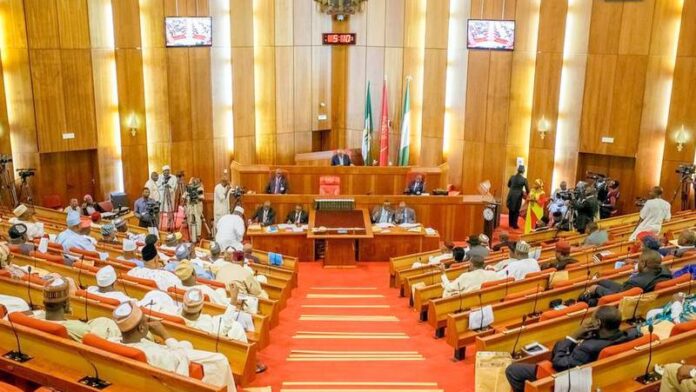As per the News Agency of Nigeria (NAN) reports, the Senate on Thursday rejected a bill that aimed to modify the Foreign Exchange Act of 2004 by incorporating provisions for the regulation, oversight, and tracking of transactions in the Currency Market.
Tuesday, February 20 was the first reading of the bill, which was sponsored by Sani Musa (APC-Niger), the chairman of the Senate Committee on Finance. It was titled “The Foreign Exchange (Control and Monitoring) Bill, 2024 (SB. 353).”
The Foreign Exchange (Monitoring and Miscellaneous Provisions) Act, Cap. F34, Laws of the Federation of Nigeria, 2004 is to be repealed, according to Musa, who led the bill’s debate.
He said that market transactions and related topics will be regulated, observed, and overseen by the proposed law. By enabling international transactions and preserving a balance of international payments, it also sought to support the healthy growth of the national economy.
“By ensuring the liberalization of foreign exchange transactions to maintain an equilibrium of the balance of international payments,” stated Sen. Musa, the bill aims to stabilize the value of the currency.
“It will also sustain the currency’s value by ensuring the deregulation of foreign exchange transactions and other international transactions, as well as revitalising market functionality. The newly proposed clauses will enable the CBN to decide the basic exchange rate of purchasing and selling foreign exchange.”
Rejection of the bill by senators
Senators, however, voiced worries that additional laws that would be detrimental to the CBN’s present attempts to oversee or regulate the foreign currency market could be introduced.
Senators Solomon Adeola (Chairman of the Appropriations Committee), Tokunbo Abiru (Chairman of the Banking, Insurance, and Other Financial Institutions Committee), and Aliyu Wadada (Chairman of the Senate Public Accounts Committee) were among the prominent senators who expressed grave concerns about the proposed law.
Passing such a bill, according to Senator Ibrahim Dankwambo (APC-Gombe), would confuse Nigerians. In order to prevent a crisis in the industry, he stated that any additional regulation of the foreign currency market should come from the executive branch.
The senators who had previously spoken had painstakingly outlined and emphasised the inconsistencies and detrimental effects of passing the legislation, as Senator Adams Oshiomhole (APC-Edo) pointed out.
Oshiomhole thought that since the bill would essentially take over the CBN’s monetary policy regulations, it should not be pursued further.
He emphasised that the Senate was not responsible for such matters and suggested that the executive branch may draft a measure to further expand the CBN’s regulatory powers if they so desired.
Godswill Akpabio, the Senate President, pleaded with Senator Musa to remove the proposed legislation so that more discussions could take place, but the senator refused.
A voice vote was then requested by Sen. Akpabio to determine whether the bill should be approved or rejected for a second reading. The majority of lawmakers voted against it.



